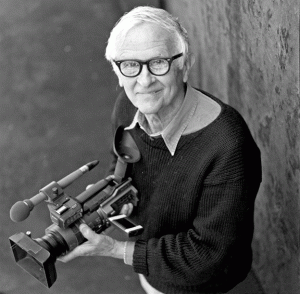Documentary filmmaker Albert Maysles is recognized as a pioneer of nonfiction feature films, earning his reputation for his work on human drama. He has not only filmed famous artists like “The Rolling Stones” in his 1969 documentary “Gimme Shelter,” but also everyday people in his 1975 documentary “Grey Gardens,” making him an extraordinary witness to the last half-century.

Accent Editor Kelsey Fowler spoke with Maysles about his first years in film, the development of his style and his upcoming visit to Ithaca College.
Kelsey Fowler: How did you get started in film?
Albert Maysles: Well I started life as a teacher. I taught psychology at Boston University for three years when I was 26, 27 and 28, and then I went to Russia hoping to make a film in mental hospitals, and that’s what I did. That was my first film, in mental hospitals in Russia. I had to learn it myself. It was very difficult. At the time I started there really was no education for making movies. I had to build my own camera.
KF: You built your own camera? That seems like a far cry from the technology available today.
AM: The new technology has helped us a lot. It’s much less expensive, so anybody can afford a video camera. It’s something like $3 or $4 for a whole hour’s worth of tape. When I started out, I had such a primitive camera that I couldn’t even record sound. Then when I built my own camera I found that I could really get very close to people and into what they’re doing without interfering and not running out of film or whatever.
KF: Do you consider yourself a witness to history?
AM: Exactly. All the way from filming JFK and Humphrey when they battled it out in their primary election campaign in 1960 to a very poor black family in the South who otherwise would never be in the news or on film except that I filmed them, and now everybody knows what it’s like to be poor.
KF: What are you working on now?
AM: I’m filming children younger than age 6 or so just to see what they have to say to each other. I’ve been filming two at a time, and it’s fascinating. They have their own language so to speak which is really quite beautiful. They come up with ideas that are really off the wall but very interesting.
KF: What is the best movie you’ve seen lately? Are there any good new films out there?
AM: “Man on Wire,” which is about the tightrope walker at the World Trade Center. I thought that was a very good film. I don’t see that many films because I’m too much of a critic, but there are more and more good films that are being made. It’s kind of crazy, but as good as documentaries are — and many times better than fiction — the world of critics hasn’t come quite around to it, recognizing them and saying, ‘Oh well, it’s only a documentary.’ In fact, people come up with the 100 best films ever made, and not one of them is a documentary.
KF: How has the genre of documentary evolved since you first began?
AM: Documentaries have become sophisticated enough so you can really call some of them — like the ones I’m showing — you can call each one of those a feature documentary — not just feature length, but truly a feature film.
KF: What are you planning to talk about in your master class?
AM: What I believe to be the most essential and the most important part of documentary filmmaking, which is to film in a fashion that humanizes and that allows the viewer to connect with the experience so that it really feels like you’re in the shoes of the people on the screen. Also I’ll be showing three-to-four-minute clips of my films.
KF: What do you hope students will learn from coming to your class or screenings?
AM: I hope they’ll develop a taste for expecting more out of documentaries than they might not otherwise by having seen a film like “Grey Gardens.” It’s very rare that one gets that close to a mother and daughter relationship or any human relationship that is so profoundly and still entertainingly centered.
KF: Did you ever want another job?
AM: I’m one of those people who is very pleased with having selected what, for me, was certainly the right profession. I’m excited about it every time I go out to make a film. It’s something that I believe in, something that can make for a better world usually. I mean, that’s certainly the kind of film I want to make and I know documentary has that potential.
Albert Maysles will teach a master class at noon Monday. “Grey Gardens” will screen at 7 p.m. Monday, and “Salesman” will screen at noon Tuesday. All events will be held in Park Auditorium with Q&A sessions to follow. “Gimme Shelter” will screen at 4 p.m. Sunday at Cinemapolis with a Q&A to follow. Tickets are $8 for students.




